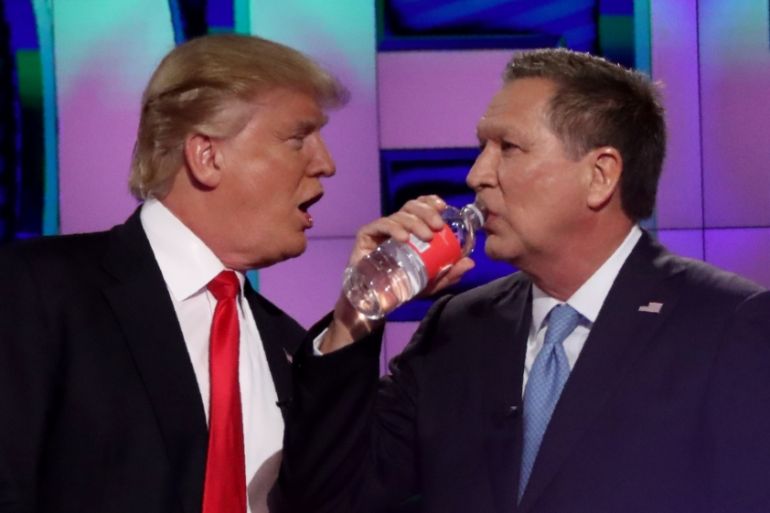John Kasich and Donald Trump in tight Ohio primary race
Polls show Ohio governor either in a tie with or leading billionaire businessman in contest for state’s 66 delegates.

Despite sitting fourth in virtually every national poll, Ohio Governor John Kasich is shaping up as the man to potentially stop, or at least slow, Donald Trump’s momentum as he surges towards becoming the Republican nominee for the United States presidency.
Ohio, Florida, Illinois, North Carolina and Missouri hold nominating contests on Tuesday for the November 8 election to succeed Democratic President Barack Obama.
Keep reading
list of 4 itemsSummer Lee’s primary race tests fallout for critics of the US’s Gaza policy
Maldives votes in parliamentary elections amid India-China rivalry
Will India’s election be free and fair?
All up, 367 delegates are up for grabs with Florida and Ohio holding the big prizes of 99 delegates and 66 delegates, respectively – which will be awarded on a winner-takes-all basis.
|
|
Elsewhere, North Carolina’s delegates will be doled out proportionally, while Illinois and Missouri award their delegates at the congressional-district level. The territory of the Northern Mariana islands, near Guam in the Pacific Ocean, will also award nine delegates in caucuses.
Polls have consistently shown Trump enjoying a large lead in Florida, despite the candidacy of the state’s senator, Marco Rubio.
The latest average of major polls in the state, published by RealClearPolitics, shows Trump leading with 43 percent, ahead of Rubio at 24.4 percent.
Texas Senator Ted Cruz trails in third on 18.7 percent, with Kasich a distant last with 9.1 percent.
But in Ohio, the most recent polls – albeit with small sample sizes – show that Kasich is either in a tie with Trump, or leading by a few points.
Cruz and Rubio, meanwhile, barely factor into the equation, leaving a likely two-man race for the state’s 66 delegates.
If Trump wins Ohio, most analysts believe it will be difficult for any other candidate to win enough delegates to overtake him for the party’s nomination, as many of the remaining states to vote award their delegates on a winner-takes-all basis.
To win the party’s nomination, candidates need 1,237 delegates. To date, Trump leads the race with 460 delegates, ahead of Cruz on 370, Rubio on 163 and Kasich on 63.
But a Kasich victory in Ohio, and a split of delegates in other states voting on Tuesday, will make that job more difficult and potentially set up a contested Republican convention.
Trump used social media to go on the attack against Kasich on Monday, with a series of tweets questioning the governor’s candidacy and commitment to Ohio.
Kasich has helped decimate the coal and steel industries in Ohio. I will bring them back! #MakeAmericaGreatAgain
— Donald J. Trump (@realDonaldTrump) March 14, 2016
Republicans back Kasich
Several senior Republicans have come out in support of Kasich in Ohio in recent days, including 2012 presidential contender Mitt Romney and former House Speaker John Boehner.
|
|
Ohio State University political scientist Vladimir Kogan told Al Jazeera that even though Kasich has struggled nationally, the popular governor has stayed in the race so he can contest his home state.
“A lot of national republicans have been asking him to get out of the race. And, he’s been saying, I can’t do that. I’m the only person who can win Ohio, and if don’t win Ohio, Trump’s got the nomination,” Kogan said.
In the Democratic race, Hillary Clinton, a former secretary of state, hopes to pull away from Vermont Senator Bernie Sanders in Tuesday’s voting.
Polls give her a big lead in Florida and North Carolina, but showed Sanders gaining ground in Ohio, Illinois and Missouri.
Sanders’ win last week in Michigan, where polls indicated he trailed by double-digit margins, showed his ability to pull off a surprise.